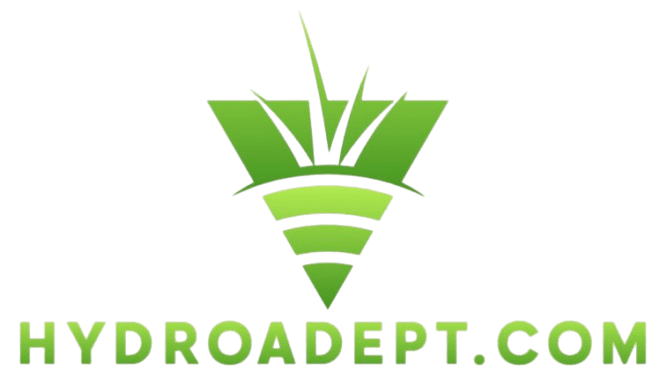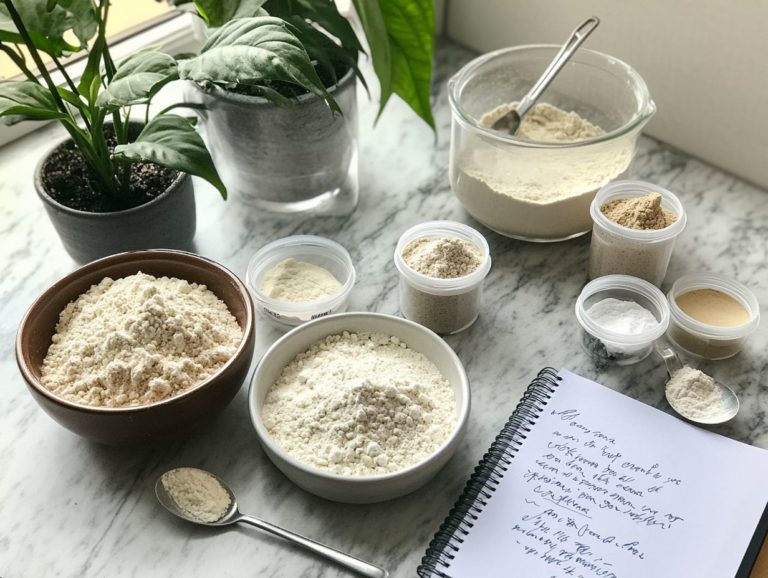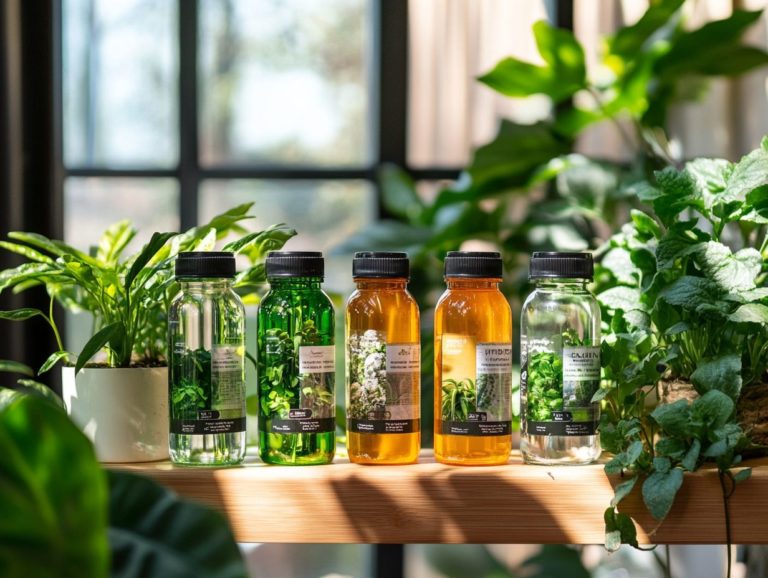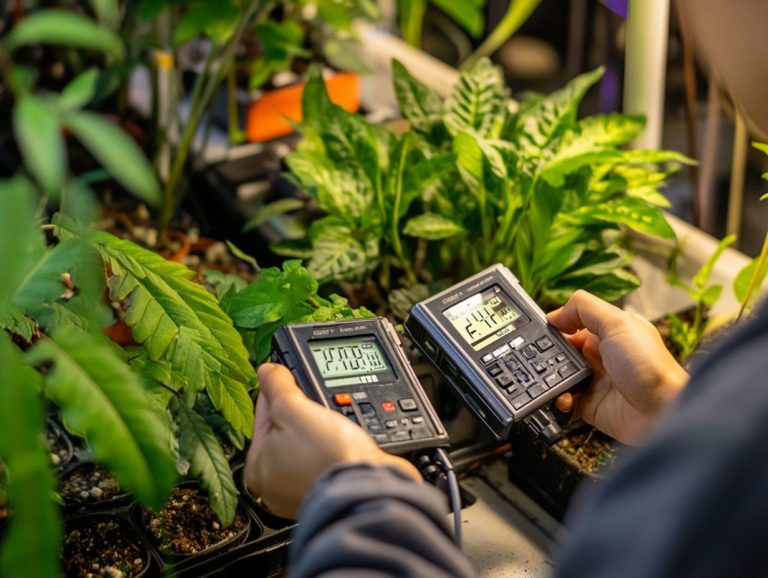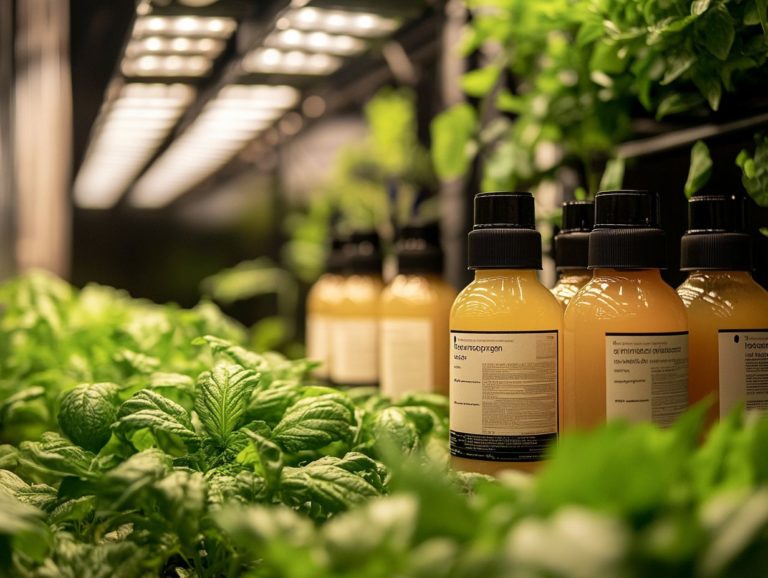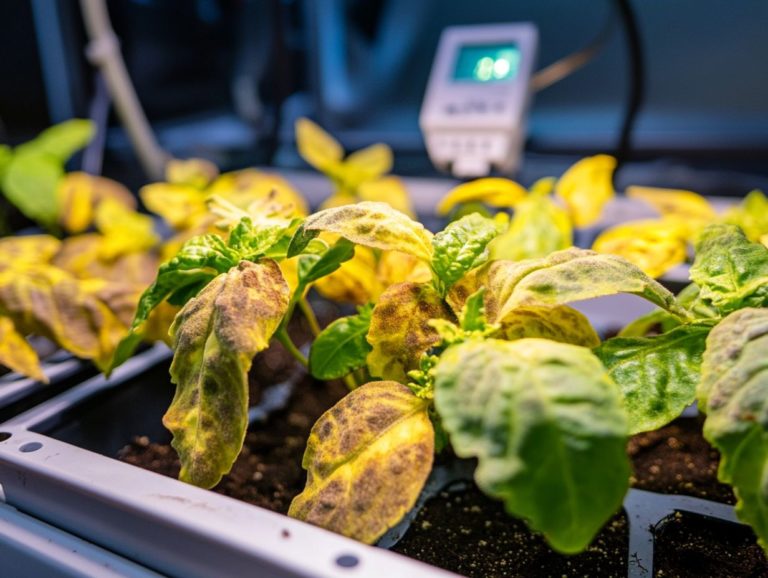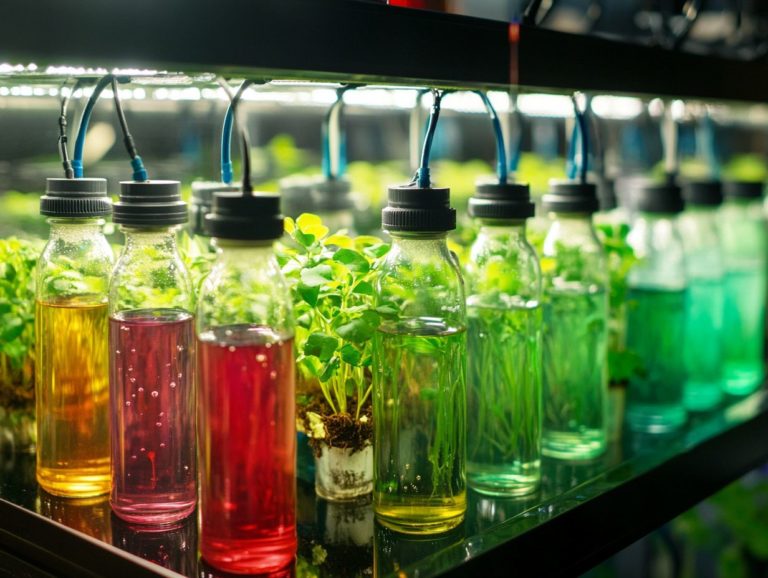Top 5 Hydroponic Fertilizers for Beginners
Growing plants without soil opens up a world of endless possibilities, allowing you to cultivate your green thumb with ease. However, understanding plant nutrition is crucial for success.
Selecting the right hydroponic fertilizer is essential to ensure your plants not only survive but thrive. This article explores hydroponic fertilizers and their vital role in this innovative growing method.
You ll discover the top five fertilizers perfect for beginners, along with comparisons of their features, nutrient content, and other important details.
You will also find valuable tips on choosing the right fertilizer and troubleshooting any issues, keeping your hydroponic system vibrant and flourishing.
Contents
- Key Takeaways:
- 1. What Is Hydroponic Fertilizer and Why Is It Important?
- 2. The Top 5 Hydroponic Fertilizers for Beginners
- 3. How to Choose the Right Fertilizer for Your Hydroponic System
- 4. Troubleshooting Common Fertilizer Issues
- What Are Some Signs of Nutrient Deficiencies?
- How Can You Correct Nutrient Imbalances?
- What Are Some Tips for Preventing Fertilizer Buildup in Your System?
- What Are the Key Takeaways?
- What Are Some Additional Resources for Learning More About Hydroponic Fertilizers?
- How Can You Implement What You ve Learned?
- Frequently Asked Questions
- 1. What are the top 5 hydroponic fertilizers for beginners?
- 2. How do I decide which hydroponic fertilizer is best for my plants?
- 3. Can I mix different hydroponic fertilizers together?
- 4. Are there any organic options for hydroponic fertilizers?
- 5. Do I need to adjust the pH level when using hydroponic fertilizers?
- 6. How often should I fertilize my hydroponic plants?
Key Takeaways:
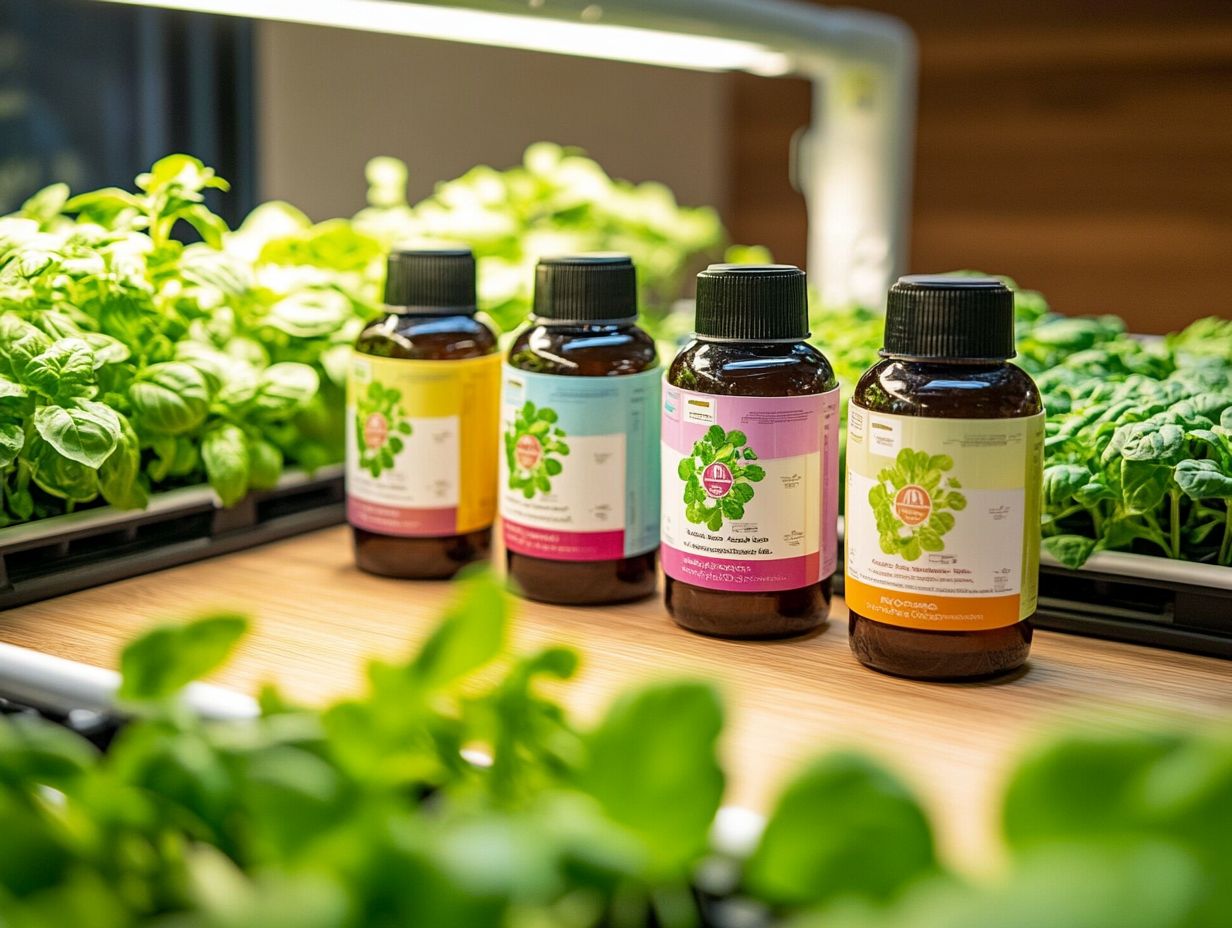
- Fertilizers are crucial for healthy plant growth in hydroponic systems.
- Top 5 fertilizers for beginners: General Hydroponics Flora Grow, MaxiGro, Dyna-Gro Liquid Grow, Botanicare Pure Blend Pro, and Fox Farm Grow Big.
- When choosing a fertilizer, consider factors such as nutrient content, usage instructions, and special considerations.
1. What Is Hydroponic Fertilizer and Why Is It Important?
Hydroponic fertilizer is a nutrient solution designed to support plant growth in soilless setups. It is vital for successful gardening without soil. Brands like Dyna-Gro and General Hydroponics offer specialized fertilizers that provide essential nutrients.
These fertilizers contain macronutrients like nitrogen, phosphorus, and potassium as well as micronutrients that promote plant health and chlorophyll production.
Understanding your nutrient regimen is key to optimizing plant growth and preventing deficiencies. You want a balanced nutrient solution tailored to your hydroponics system’s specific needs.
Fertilizers come in various forms, including liquid and powdered types. Liquid fertilizers deliver nutrients quickly, which is perfect for systems like deep water culture where rapid nutrient uptake is essential.
On the other hand, powdered fertilizers require mixing but allow you to adjust nutrient levels according to your plants growth stages.
A critical aspect of these fertilizers is their nutrient balance. An ideal mix includes macronutrients like magnesium and calcium, and micronutrients such as iron and manganese. For instance, the General Hydroponics Flora Series lets you customize nutrient levels based on your plants’ growth cycle, whether they are seedlings or fully grown.
This flexibility is crucial for achieving optimal yields and ensuring your plants receive the right nourishment.
2. The Top 5 Hydroponic Fertilizers for Beginners
If you re new to growing plants without soil, choosing the right fertilizer can feel overwhelming. Fortunately, five standout options simplify this process with easy-to-use and cost-effective nutrients.
Brands like Dyna-Gro, General Hydroponics, Fox Farm, and Advanced Nutrients offer unique formulations to meet the specific needs of different plants.
These products not only supply essential macro and micronutrients but also cater to the unique growing conditions required for hydroponics. As a beginner, you’ll appreciate the straightforward application methods; top hydroponic growing systems are available in both liquid and powdered forms, making them easy to integrate into your setup.
With features like balanced nutrient ratios and stability in pH levels, you re setting your plants up for optimal growth. Plus, unique formulations designed for various growth stages support everything from seedlings to fruiting plants.
By exploring these fertilizers, you re sure to enhance the growth and health of your plants, leading to a rewarding hydroponic experience.
Get ready to transform your gardening adventure with the right fertilizers!
What Are the Key Features of Each Fertilizer?
Each hydroponic fertilizer has unique features. These are designed to meet the specific nutrient needs of your plants, such as nutrient types and effectiveness.
These features are essential for promoting healthy growth and maximizing yield. For example, Dyna-Gro is renowned for its all-encompassing formula. Fox Farm fertilizers highlight organic ingredients. Advanced Nutrients employs cutting-edge technologies to enhance nutrient absorption.
These distinctions can profoundly influence plant development in hydroponic systems. Dyna-Gro offers a well-balanced mix of macro and micronutrients, making it perfect for a wide variety of crops, from leafy greens to fruiting plants.
Conversely, Fox Farm’s organic approach fosters sustainable practices and appeals to growers who prefer natural methods.
Meanwhile, Advanced Nutrients provides specialized formulations tailored for different growth stages, optimizing usage and maximizing output.
The application methods for each option, whether through reservoirs or foliar feeding, are also crucial. They present various advantages that cater to your gardening preferences.
How Do These Fertilizers Compare in Terms of Nutrient Content?
When comparing the nutrient content of top hydroponic fertilizers, it’s crucial to look into their macronutrient ratios and micronutrient compositions.
These factors play a significant role in influencing plant health and growth potential. By understanding how each product balances nitrogen, phosphorus, potassium, and essential trace elements, you can make informed decisions.
For example, one fertilizer might have high nitrogen content, perfect for promoting lush, green foliage. Another might focus on potassium to enhance flowering and fruiting.
Don t overlook micronutrients, like iron and manganese. They are vital for photosynthesis and enzyme functions, emphasizing the necessity of a balanced nutrient profile.
By carefully evaluating these differences, you can tailor your choices to meet specific crop requirements. This ensures optimal growth rates and impressive yields.
Some fertilizers even offer bioactive components that enhance nutrient uptake efficiency. This provides a modern advantage that can be incredibly appealing for anyone looking to maximize hydroponic success.
What Are the Pros and Cons of Each Fertilizer?
Evaluating the pros and cons of each hydroponic fertilizer is essential for making an informed decision. Different products offer unique nutrient benefits and potential pitfalls that could impact your hydroponic garden.
For instance, while Dyna-Gro provides a comprehensive nutrient regimen, it may not always be the most budget-friendly choice for every gardener.
You might consider General Hydroponics for its user-friendly nature and versatility. However, some users have encountered occasional nutrient lockout issues, which can slow down plant growth if not monitored closely.
While the affordability of certain fertilizers can be tempting, they might lack vital micronutrients. This can lead to deficiencies that manifest as yellowing leaves or stunted growth.
Gardening enthusiasts stress the need for a balance between cost and nutrient availability to grow thriving plants!
Ultimately, thorough research and personal experiences will guide you toward the hydroponic fertilizer that aligns perfectly with your gardening needs. Explore your options and see which fertilizer works best for you!
Recommended Usage Instructions for Each Fertilizer
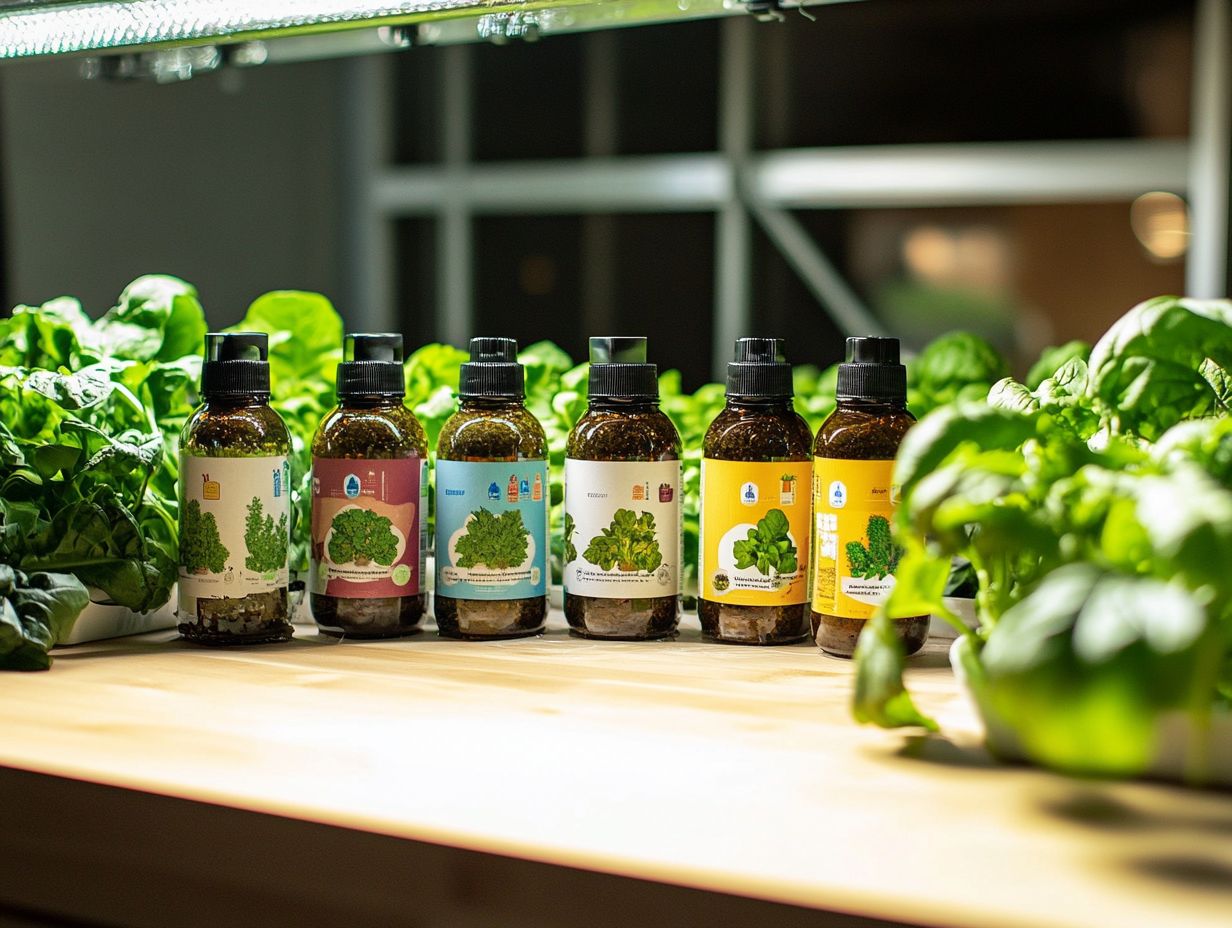
Following the usage instructions for each hydroponic fertilizer is key for applying the right nutrients and boosting plant growth. These guidelines help you mix and apply nutrients correctly, so sticking to a nutrient schedule is crucial for balance and avoiding deficiencies.
Remember, proper dosage varies with plant type and growth stage. Seedlings need lower concentrations than mature plants. When mixing fertilizers, dissolve them in water according to the specified ratios, making sure everything blends well.
Application methods differ. You might drench the growing medium or use hydroponic techniques like nutrient film. Following these steps carefully enhances your plants’ health while reducing the risk of nutrient lockout.
Special Considerations for Hydroponic Fertilizers
When using hydroponic fertilizers, consider nutrient management carefully. Monitor pH levels, adjust nutrient concentrations, and store nutrients properly for maximum effectiveness each factor impacts plant health and nutrient uptake.
Maintain an ideal pH range of 5.5 to 6.5 to ensure nutrient availability. If pH strays from this range, you may face nutrient deficiencies or toxicities in your plants. Adjust nutrient concentrations based on whether your plants are seedlings or mature, as each has different needs.
Store fertilizers in a cool, dry place to prevent degradation. Use airtight containers to preserve quality and extend shelf life, while proper handling minimizes contamination risks.
3. How to Choose the Right Fertilizer for Your Hydroponic System
Choosing the right fertilizer for your hydroponic system is crucial. You need to understand your plants’ nutrient needs and how to maintain balance for optimal growth.
Factors such as the growth stage, plant type, and your desired outcomes will influence your nutrient selection. Products like Dyna-Gro and General Hydroponics offer effective solutions.
Different plants have distinct nutrient requirements. For example, leafy greens thrive on higher nitrogen levels in early growth, while fruiting plants benefit from increased potassium as they mature.
Environmental conditions, such as light intensity and temperature, significantly impact nutrient uptake. Different hydroponic systems, like nutrient film technique or deep water culture, may need tailored nutrient solutions.
Understanding how these elements work together ensures that your fertilizer choice aligns with your plants’ specific needs. This leads to robust growth and bountiful harvests.
What Factors Should You Consider?
Several critical factors must be considered when choosing fertilizer for your hydroponic system. Pay attention to your plants’ specific nutrient needs and the available nutrient options to ensure effectiveness.
Each stage of plant growth requires different nutrient ratios. For example, seedlings need higher nitrogen levels for strong leaf development, while flowering plants require more phosphorus and potassium for blooming.
Research the origins and processing of nutrient products, as quality can vary between brands. Evaluating options based on their composition will help you nurture healthier, more productive plants.
What Are the Common Mistakes to Avoid When Choosing a Fertilizer?
Avoiding common mistakes when choosing a hydroponic fertilizer can save you time, money, and frustration. Incorrect selections can lead to nutrient issues that stunt plant growth.
Many gardeners overlook their crops’ specific nutrient needs. They often reach for a general fertilizer that may lack the necessary balance.
Misjudging nutrient ratios can cause over-fertilization or under-fertilization, both of which harm plant health. To navigate these challenges effectively, conduct thorough research on your plants’ requirements.
Pay close attention to labels and consult with experts. Familiarizing yourself with nutrient interactions will empower you to make informed decisions that enhance both growth and yield.
Ultimately, selecting the right fertilizer tailored to specific needs can transform your garden’s success! This is especially true when using cost-effective nutrients and solutions.
How Can You Determine the Nutrient Needs of Your Plants?
Determining the nutrient needs of your plants is crucial for effective management in a hydroponic system. Regular monitoring and adjusting your nutrient schedule according to different growth stages will help your garden thrive.
Watch for signs of nutrient deficiencies, like leaf discoloration or stunted growth. These visual cues are vital for making necessary adjustments.
Know the growth stages, from seedling to flowering. This helps you create tailored nutrient solutions that meet your plants’ evolving demands.
For example, young seedlings crave higher nitrogen levels, while fruiting plants thrive with phosphorus and potassium. Stay attuned to these indicators to ensure your plants receive optimal levels for vibrant health and maximum yield!
What Are Some Tips for Using Fertilizers in Hydroponic Systems?
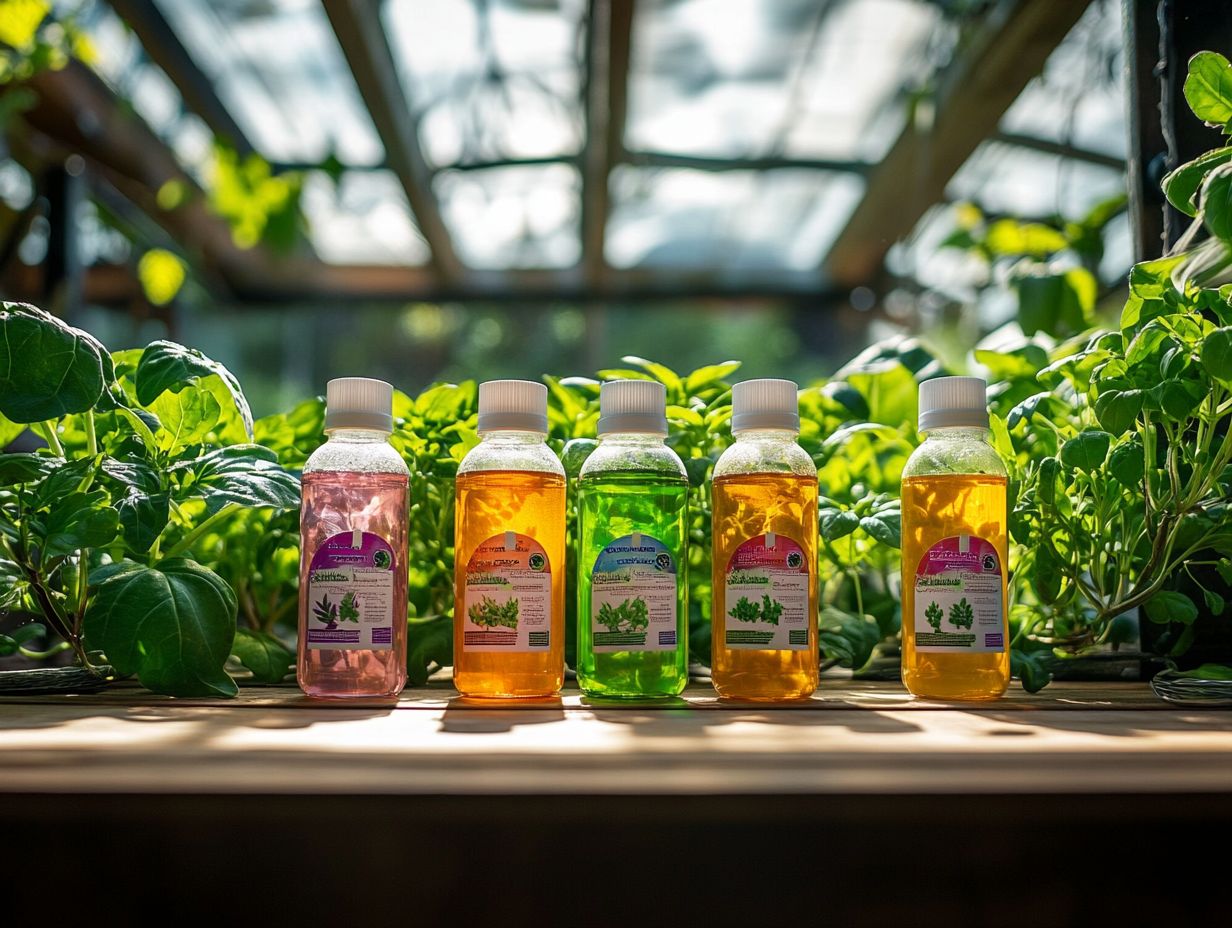
Using fertilizers in hydroponic systems requires understanding key tips for nutrient applications and maintaining the right nutrient concentration. Follow these practices to cultivate robust plant health and achieve optimal yields.
Start by mixing your nutrients thoroughly before adding them to your system. This ensures all plants receive a well-balanced supply of essential nutrients.
Pay attention to timing. Monitor growth stages to adjust nutrient delivery for maximum absorption. Regularly check nutrient concentration to fine-tune your formula and stick to a nutrient schedule for consistent feeding.
Observing your plants is crucial. Their responses will guide you in making necessary adjustments and tailoring the nutrient mixture to meet each crop’s specific needs.
4. Troubleshooting Common Fertilizer Issues
Troubleshooting common fertilizer problems is vital for successful hydroponic gardening. Nutrient deficiencies can greatly affect plant health and yield.
Recognize signs of nutrient imbalance quickly. For example, yellowing leaves might indicate a nitrogen deficiency, while brown leaf tips can suggest excess phosphorus. Identifying these symptoms early allows for corrective actions, such as adjusting concentrations or switching to a balanced fertilizer.
Regularly test your nutrient solution and monitor plant health to catch imbalances before they become serious. Proper calibration of pH and dissolved minerals is essential for effective nutrient uptake.
Stay vigilant and informed to restore nutrient balance in your hydroponic setup. This will ensure your plants thrive and grow robustly!
What Are Some Signs of Nutrient Deficiencies?
Recognizing the signs of nutrient deficiencies in your plants is crucial for effective nutrient management. Early detection can prevent significant issues that could impede growth. Look for common indicators such as yellowing leaves, stunted growth, and poor fruit development, as each of these signals specific nutrient needs.
For example, if you notice yellowing leaves, it might indicate a nitrogen deficiency, vital for chlorophyll production and overall plant vitality. Stunted growth often points to a lack of phosphorus, an essential nutrient for root development and energy transfer. If fruit development seems off, potassium could be the issue, as it plays a key role in the quality of flowers and fruit.
Monitoring these symptoms closely helps you address deficiencies quickly, ensuring your plants receive the nutrients they need to thrive. Regular soil testing and vigilant observation of plant health can significantly enhance your chances of achieving optimal growth and managing the right nutrient composition.
How Can You Correct Nutrient Imbalances?
Correcting nutrient imbalances in your hydroponic system a method of growing plants without soil is essential for achieving optimal plant health and growth. You can accomplish this by making careful adjustments to your nutrient solutions, which are liquids containing the essential nutrients plants need to grow, and applications. Maintaining the right nutrient balance not only prevents deficiencies but also fosters robust growth and ensures your plants receive the necessary nutrient quality.
A fertilization schedule that aligns with your plants’ growth stages can enhance nutrient uptake. To effectively manage nutrient concentrations, consider conducting regular analyses of your nutrient solutions to assess their composition and pH levels. A reliable testing kit can unveil which elements are lacking or in excess, allowing you to tailor your mixtures accordingly.
It’s also beneficial to keep a close eye on plant responses, as symptoms of nutrient stress can offer valuable insights for necessary adjustments. By integrating these strategies, you can cultivate a balanced environment that supports thriving plants.
What Are Some Tips for Preventing Fertilizer Buildup in Your System?
Preventing fertilizer buildup in your hydroponic system is crucial for maintaining nutrient quality and fostering healthy plant growth. Excess nutrients can create toxic conditions, hindering nutrient absorption and ultimately jeopardizing your plants. By implementing active management techniques, you can effectively mitigate these risks!
One practical approach is to regularly monitor the nutrient levels within your system, ensuring they remain balanced according to the specific needs of your plants. Flushing the system with clean water at regular intervals can also help remove any excess buildup, creating a healthier growing environment.
Developing a well-planned nutrient management strategy tailored to the unique requirements of each plant species will significantly diminish the likelihood of over-fertilization. By embracing these principles, you can cultivate thriving plants while minimizing the chance of nutrient-related issues. Keeping your system clean contributes to overall plant health!
What Are the Key Takeaways?
Your critical role in nutrient management within hydroponic gardening is essential. Selecting suitable nutrient solutions will help cultivate healthier plants and boost yields.
Understanding how to apply fertilizers and monitor nutrient needs is vital for long-term success.
As a gardening enthusiast, it s easy to overlook the specific requirements of your crops. This oversight could lead to less-than-ideal results.
By customizing your nutrient applications to meet the unique demands of different plants, you can significantly enhance growth and productivity.
Implementing best practices, like regular checking the acidity or alkalinity of your water and ensuring top-notch water quality, will further optimize plant health.
The relationship between nutrient availability and plant physiology is crucial. When you become attuned to the evolving needs of your system, you’ll be on your way to a lush and thriving garden.
Meticulous planning and a commitment to continuous learning are crucial in the ever-evolving world of hydroponics.
What Are Some Additional Resources for Learning More About Hydroponic Fertilizers?
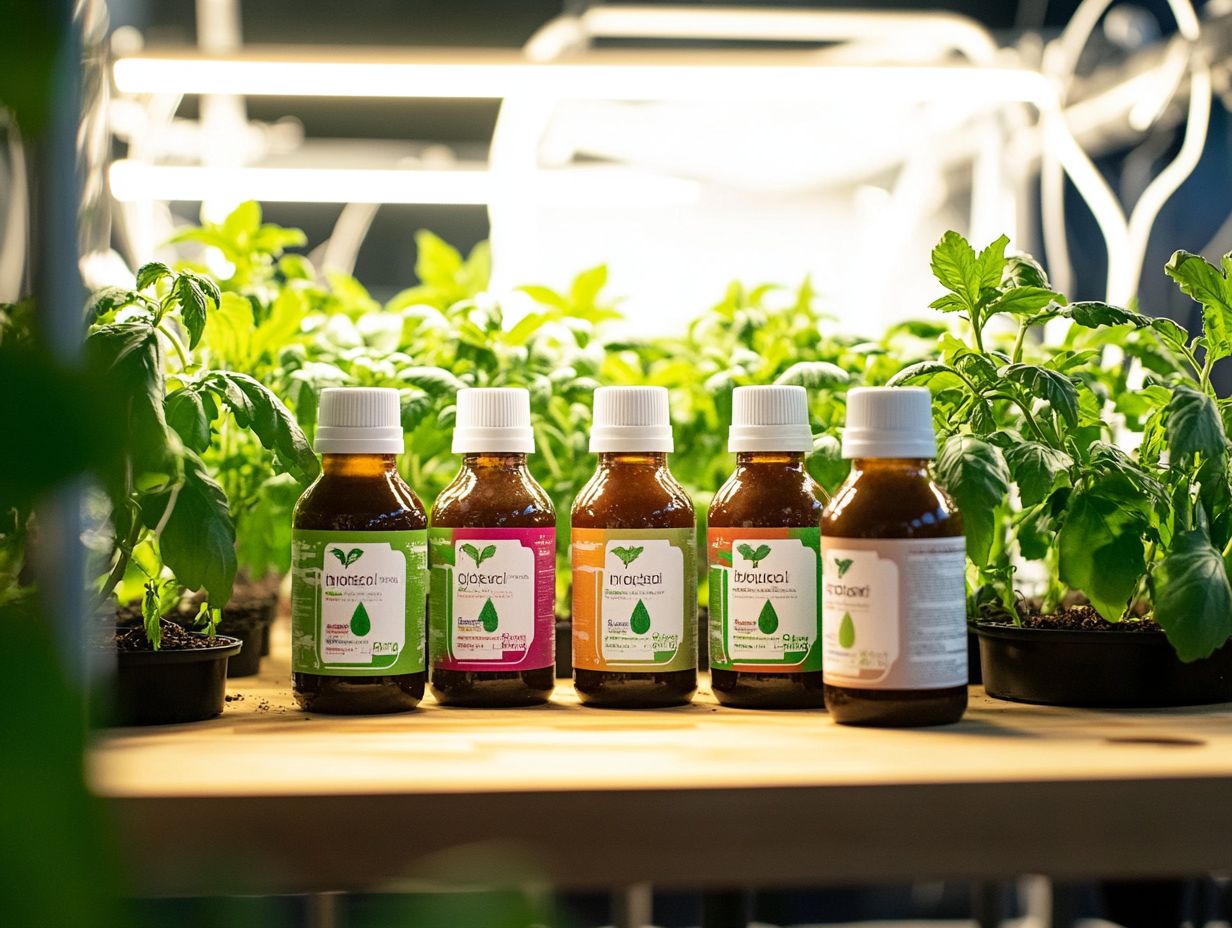
If you re eager to elevate your understanding of hydroponic fertilizers and nutrient management, a treasure trove of amazing resources is ready for you don t miss out!
Consider diving into renowned works like “Hydroponic Food Production” by Howard Resh or “The Complete Guide to Hydroponic Gardening,” both of which offer foundational knowledge and practical tips.
Websites such as gardeners.com and hydroponics.net provide current articles and product reviews that keep you informed. Community forums like Reddit s hydroponics subreddit create a space for sharing experiences and asking questions.
Engaging with online courses on platforms like Coursera or Udemy can further enhance your practical skills. By tapping into these diverse resources, you can cultivate expertise and make well-informed decisions that will enrich your gardening journey.
How Can You Implement What You ve Learned?
Implementing your knowledge of hydroponic fertilizers and nutrient management is crucial for elevating your gardening experience. This enables you to cultivate a vibrant environment for your plants.
By embracing the principles of nutrient balance, selecting the right fertilizers, and continuously monitoring your setup, you can substantially enhance both plant health and yield.
To truly enjoy the fruits of your labor, it’s vital to document your experiments with various nutrient solutions. Adjust pH levels and modify concentrations to see how they affect growth.
Feel free to swap out fertilizers and observe how those changes impact your plants. This hands-on approach can lead to invaluable learning experiences.
Engaging with local gardening communities or online forums can offer you valuable insights and support, further enriching your educational journey.
Remember, the world of hydroponics is ever-evolving. Ongoing education is essential for adapting your techniques and boosting your overall success.
Frequently Asked Questions
1. What are the top 5 hydroponic fertilizers for beginners?
The top 5 hydroponic fertilizers for beginners are General Hydroponics Flora Trio, Fox Farm Nutrient Trio, Advanced Nutrients pH Perfect Grow-Micro-Bloom, Botanicare Pure Blend Pro Grow, and Dyna-Gro Liquid Grow. These fertilizers are chosen based on their ease of use, effectiveness, and availability for beginners.
2. How do I decide which hydroponic fertilizer is best for my plants?
The best way to decide on a hydroponic fertilizer for your plants is to consider the type of plants you are growing, their growth stage, and their nutrient requirements. It is also important to choose a fertilizer that is specifically formulated for hydroponic systems to ensure optimal results.
3. Can I mix different hydroponic fertilizers together?
Mixing different hydroponic fertilizers is not recommended. They may have different amounts of nutrients, which could lead to imbalances for your plants.
It’s best to stick to one type of fertilizer or use a pre-mixed nutrient solution designed for your hydroponic system.
4. Are there any organic options for hydroponic fertilizers?
Organic options for hydroponic fertilizers exist, such as Botanicare Pure Blend Pro Grow, which is listed among the top 5 choices.
These fertilizers use natural ingredients to provide essential nutrients for your plants. Keep in mind that while many organic fertilizers are great, not every one of them works well in hydroponics.
5. Do I need to adjust the pH level when using hydroponic fertilizers?
Yes! Adjusting the pH level is crucial when using hydroponic fertilizers. The pH level measures how acidic or basic a solution is, and it’s vital for your plants’ health.
Hydroponic systems have a specific pH range that is optimal for nutrient uptake. Using a pH meter and adjusting the solution will ensure your plants receive the right nutrients at the right time.
6. How often should I fertilize my hydroponic plants?
The frequency of fertilization depends on the type of hydroponic fertilizer you are using and the growth stage of your plants.
Follow the instructions on the fertilizer label or consult a hydroponic expert to determine the best fertilization schedule for your specific plants and system.
